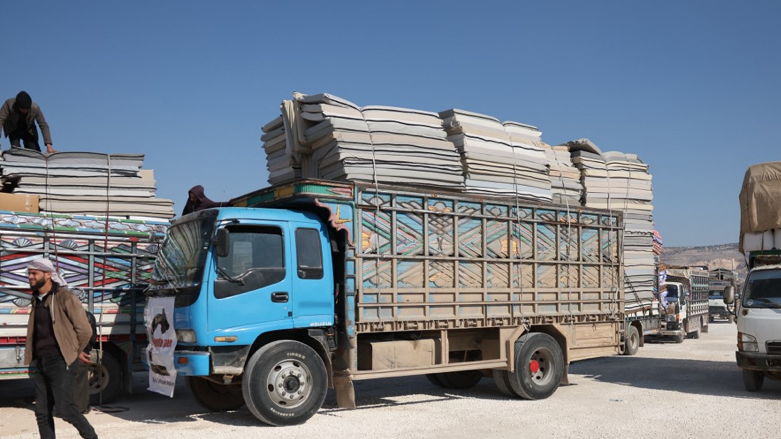Syrian Kurdish party to reopen offices in Afrin after deadly earthquake

ERBIL (Kurdistan 24) – The Kurdish National Council (KNC) in a statement on Sunday announced they will activate the role of the KNC in Afrin and open its headquarters, following the deadly earthquakes that hit both Turkey and Syria earlier this month.
Moreover, the KNC said they will try to “help the afflicted and alleviate the suffering of the victims, as well as assess the damage resulting from the quakes in the affected areas.”
In March 2018, Turkey and rebel groups retook control of Afrin during “Operation Olive Branch.” Following the operation, the KNC had to close down its offices, amidst widespread allegations of human right violations and kidnappings.
Read More: Syrian opposition fails to stop war crimes in Afrin: Kurdish National Council
The KCN had previously accused the Syrian opposition of not stopping human rights abuses in Afrin, despite being part of the Turkish-backed Syrian opposition groups.
Nevertheless, the KNC called on civilians to return to Afrin to prevent demographic changes caused by the huge influx of Syrians from other areas following the Turkish operation. This was all before the earthquakes struck.
According to civil society organizations, before 2011, Kurds comprised 96 percent of Afrin's population, now it is only 25 percent of the population.
The KNC held its regular meeting on Feb. 17, 2023 in Qamishlo and discussed the disaster that the earthquake caused in the Kurdish region of Afrin.
According to the Jinderes Council, at least 1,100 people died in Afrin’s Jinderes following the earthquake.
Moreover, a damage assessment in Jindires from the international organization, UNOSA, identified 228 damaged structures, and another 318 that were partially damaged.
Read More: As the first international aid group in Syria’s Jinderis, BCF delivers 250 tons of aid
As the first responders to the scene, the Kurdistan Region’s Barzani Charity Foundation (BCF) provided aid to the quake-stricken town of Jindris in Afrin. The relief team was welcomed by locals with Kurdish flags.
During its regular meeting, the KNC expressed their appreciation for the assistance that the Kurdistan Region provided, under the leadership of his “Excellency President Masoud Barzani, and through the Barzani Charity Foundation.”
Read More: President Masoud Barzani expresses gratitude to the Barzani Charity Foundation
President Masoud Barzani, the leader of the Kurdistan Democratic Party (KDP), also thanked Musa Ahmad, the head of BCF, in a phone call for helping the victims of the recent quakes in Afrin.
President Barzani urged the BCF to continue to assist all communities in Afrin.
The Kurdish aid group, Barzani Charity Foundation (BCF), inaugurated its office in the northern Syrian province of Afrin (Rojava), to further the relief efforts for the victims of the Feb. 6 earthquakes, the agency announced. pic.twitter.com/M2twcUL5LG
— Kurdistan 24 English (@K24English) February 20, 2023
Yesterday, the BCF inaugurated its office in Afrin. Speaking to Kurdistan 24, the head of BCF, Musa Ahma, said they will remain in Afrin to continue to assist relief efforts.
KNC has been re-activated
“As we know KNC offices, being closed in Afrin nearly since 2014, by the autonomous administration (AANES), and after the Olive Branch operation the KNC had a very strict position against the control of the opposition, armed groups, and their actions in the city,” Bedir Mulla Rashid, Director of Raman Center for Research and Consultancy told Kurdistan 24.
“Also, we have seen the coordination between Türkiye and the KRG to allow the Barzani Charity Foundation to enter Afrin and help the people in need. This led to an opening for the KNC to discuss this topic.”
Aron Lund, a fellow with Century International, told Kurdistan 24 that he suspects that the “KNC may feel a sense of responsibility to act during this emergency, and also sees an opportunity to position themselves where it matters.”
“There is now an influx of aid from Barzani’s regional government in Iraqi Kurdistan, and if their main sponsor can be involved, why can't they?,” he said.
“They [KNC] have effectively been excluded from the politics in this area, while the opposition to Turkish-backed rebels identified with YPG (People’s Protection Units), and smaller groups of Turkish-backed local figures have been used to represent the ‘Kurdish voice’. There is potentially a niche there to fill, if they play their cards right.”
After 2018, only the small pro-Turkish Association of Independent Syrian Kurds operated in Afrin. Before 2018, the YPG controlled Afrin.
So far, the main rival to the KNC, the Democratic Union Party (PYD) or the local AANES authorities in northeast Syria, has not commented on KNC’s decision to return to Afrin.
